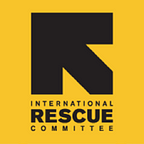Amid the tragedy, refugee kids laugh again
Children’s laughter fills the playing yard in Alexandria refugee site in northern Greece, as teams of young refugees snake their way to activities from face painting to hula-hooping. Many are dressed in their finest; flowery dresses with lace white socks and smart checked shirts. One little lad even sports a bow tie.
Today is Eid, the Muslim festival that follows the holy month of Ramadan, and the children are celebrating with a day of games organised by the IRC.
At the tug of war, an all girls team grimace as they pull and heave, heels dug in and kicking up dust. They win — and jump in the air with glee. In front of the stage, children dance to booming music as homemade coloured lanterns bob above their heads.
“My favourite was the sack race,” says nine-year-old Zakariah.
His smile, beneath a silver twirling moustache belies the tragedy he and his family have been through. Zakariah was one of five siblings. The family fled Aleppo after his brother was killed in an airstrike as he was retrieving dead bodies from the street. He was 26-years-old, and the second brother Zakariah lost to the war that has raged in his country for over five years. The first was shot by a sniper when he was just 22-years-old.
Stranded in Greece, grieving families like Zakariah’s are all too common.
In every tent there is a story of tragedy, which left these families with no choice but to flee their homes, their jobs and their loved ones. Almost all of the 730 people that live in Alexandria are from Syria, and nearly three-quarters are women and children.
The closing of the Balkans borders halted their journeys to the rest of Europe, often where they hope to reunite with family. Their anguish continues as they live in tents waiting for asylum to be granted. With up to 57,000 refugees making applications in Greece, many will be here for months before they can move on and begin to rebuild their lives.
“The heat is the worst — and the mosquitoes and flies,” says Zachariah’s father, Ahmed as he and his wife Fatima sit under the shade of a tree, waiting for the day to pass. Fatima pulls back her sleeve to show the aggravated bites all over her arms. Ahmed continues:
“In Syria we had a car and a house, our life was very different.”
Zakariah’s eldest brother, Mohamed-Nour, is one of nine volunteer facilitators at the IRC’s Safe Healing & Learning Space.
He led the organisation of the games day: “I wanted to let the children be happy and enjoy themselves,” he says. “They haven’t seen the joy of Eid and the happiness it brings.”
Around 130 children aged between three-years-old and 17-years-old attend the IRC’s safe space every day, where lessons and games help them to build social skills and cope with trauma while also having fun.
The Safe Healing & Learning Space in Alexandria site is one of three set up by the IRC in Greece, and the IRC also run five safe spaces for women. All are funded by EU humanitarian aid as part of a €10,000,000 grant for the IRC’s refugee response in Greece.
Deborah Nicol, Acting Protection Coordinator for IRC in northern Greece said: “Women and children are amongst the most vulnerable in this crisis, and their protection is at the heart of the IRC’s response. Activities like this are important as they help children just be children once again.”
As he watches over the activities, Mohamed-Nour reflects:
“I hope for the children a good life. Not like here nor in Syria where we saw war every day. I hope that soon they can study and live well.”
Refugee Crisis: How the IRC helps
Since January 2015 over one million refugees have travelled through Greece in search of safety and sanctuary in Europe. The IRC has been responding to the crisis in Greece since July 2015, and in March 2016, expanded its response to the Greek mainland. Supported by the European Commission’s Humanitarian aid and Civil Protection department (ECHO), the IRC in Greece is focused on three areas: environmental health, emergency financial assistance, and protection and information. The IRC programme funded by ECHO benefits refugees currently stranded in eight sites across Greece. Learn more about the IRC’s response to the refugee crisis. Follow us on Twitter, Facebook and Medium.
By Kathleen Prior, IRC Communications & Content Officer in Greece. Follow Kathleen on Twitter: @KathleenAPrior
